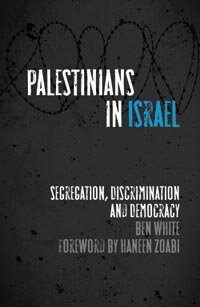Ben White’s Jadaliyya Interview, Jadaliyya – 1 Feb 2012
www.jadaliyya.com/pages/index/4189/new-texts-out-now_ben-white-palestinians-in-israel
Ben White, Palestinians in Israel: Segregation, Discrimination and Democracy foreword by Haneen Zoabi
London: Pluto Press and New York: Palgrave Macmillan, 2011

Ben White
Jadaliyya (J): What made you write this book?
Ben White (BW): I wanted to write something that would accessibly describe the policies of segregation and discrimination that Palestinian citizens in Israel have experienced since 1948. Many people—even those who are engaged with Palestine/Israel to some extent—are unaware of the ways in which the Palestinian minority has been systematically marginalized in ways that go far beyond the “complaints of inequality” that surface in mainstream media on occasion. This is more than popular prejudice; we are talking about systematic discrimination in key areas of state policy such as immigration, citizenship, housing, planning, and budgets. So, for example, since 1948, over seven hundred Jewish communities have been established in Israel’s pre-1967 borders (that is, not including West Bank settlements). Yet in the same period, not one new city, town or village for the Palestinian minority has been created, with the exception of seven townships made for forcibly displaced Bedouin in the Negev. The state’s approach towards its own citizens mirrors the pattern we see in the occupied West Bank. Jewish housing and construction is privileged in parallel with Palestinian housing and land ownership being targeted for demolitions, bureaucratic obstacles, and fragmentation.
A further reason to write the book is that the issues that emerge when you consider the Palestinian minority in Israel go straight to the heart of the conflict. So the book, for me, is also a way of elaborating on some ideas and connections that have increasingly cropped up in my articles over the last couple of years.
J: What particular topics, issues, and literatures does it address?
BW: A lot of the focus is on concisely describing Israel’s land regime, with the expropriation of Palestinian property, the manipulation of the planning system, and so on. There is also a chapter on “Judaization”—policies intended to boost the number of Jews living and controlling a certain space in relation to Palestinian citizens, and the way in which this is informed by the wider racism and incitement that is commonplace. Judaization as a key factor shaping planning and housing has been particularly pronounced in the Galilee and Negev, two regions at opposite ends of the country. In the former, land confiscation from Palestinian citizens and refugees in the 1950s was then complemented by the establishment in the late 1970s and 1980s of so-called “look-out settlements”: small Jewish communities built on hill tops overlooking Palestinian population centers. In the latter and in the south, Bedouin Palestinians have been expelled, “concentrated” in particular areas, and harassed for trying to remain in their communities—many of which are deemed “illegal.” At the same time, successive governments have explicitly urged Jews to move to the Negev, often making a direct connection between such initiatives and “countering” a supposed “threat” posed by the Bedouin.
Aside from particular case studies and phenomena like the unrecognized villages and discrimination in the education system, the book also tackles head-on the problems with Israel’s identification as a “Jewish and democratic” state. My contention is that this formulation is intended to mask the profoundly undemocratic reality of both the establishment of Israel in the first place and the maintenance of a regime that benefits one group at the expense of another.
J: How does this work connect to and/or depart from your previous research and writing?
BW: I have been visiting Palestine/Israel since 2003. On most of my first few trips, I was primarily spending time in the West Bank. In the last few years, however, I have done more work on the struggle of Palestinians in Israel. As I have spent time crossing back and forth across the “Green Line”, I began to see how Israel’s policies are driven by the same priorities in the Jordan Valley and the Negev. The idea of a “de facto, one state” is an assessment relating to authority and sovereignty, based on the fact of Israel’s control over the people living between the River and the Sea.

Ben White: Palestinians in Israel
But this kind of analysis also points towards a way of understanding the situation outside of the post-1967 occupation paradigm. This means going beyond a way of viewing the “Israeli-Palestinian conflict” as one primarily relating to Israel’s military occupation of the West Bank and Gaza towards how the future of those territories can be best resolved. It means considering the territory as a single “unit”: one in which Jewish rights are currently privileged over Palestinian rights. And it also means seeing the future solution as being shaped by a reconfiguration of this regime of ethno-religious discrimination. It means seeing the Palestinian people’s struggle for self-determination with a holistic perspective that does not exist in the long-standing divisions into categories like “Palestinians”, “Israeli Arabs”, “refugees”. “West Bank”, “Gaza Strip”, and so on. Obviously, these can overlap. This is something I have tried to write about in my articles. It is a useful way of developing that framework is by considering the Palestinian citizens of Israel and challenging the still-common idea that inside Israel’s pre-1967 borders, there is a functioning liberal democracy.
J: Who do you hope will read this book, and what sort of impact would you like it to have?
BW: I hope that this book can be a useful resource for university students and also for human rights and solidarity activists who seek a better grasp of Israel’s discriminatory policies towards Palestinian citizens. But I also would like this to be read by those people who have an interest in the issue or region as a whole, as well as those who have never had a chance to seriously unpack the implications of Israel’s definition as a “Jewish and democratic” state. There are insights here, I believe, that are crucial for an approach to the conflict that realistically appreciate what it will take to reach a settlement.
Excerpts from Palestinians in Israel: Segregation, Discrimination and Democracy
The Negev, or al-Naqab in Arabic, is an area that has been consistently targeted by Israeli governments, along with agencies like the Jewish National Fund (JNF), for so-called “development,” i.e. Judaization. In parallel to the indigenous Bedouin Palestinians being expelled and forcibly relocated (see Chapter Two), private resources have been mobilized in order to “settle” the Negev with Jews. As a Human Rights Watch report put it in 2008, “the state’s motives” for “discriminatory, exclusionary and punitive policies” in the Negev “can be elicited from policy documents and official rhetoric.” The Israeli state’s aim: “maximizing its control over Negev land and increasing the Jewish population in the area for strategic, economic, and demographic reasons.” Professor Oren Yiftachel of Ben-Gurion University has put it bluntly: “the government wants to de-Arabize the land.”
In 2003, the then-Prime Minister, Ariel Sharon, announced a new initiative calling for thirty new towns, most in the Galilee and Negev. Apparently, Sharon had concluded that after investing in “settling the [occupied] territories” it was now “necessary to settle the Galilee and the Negev.” At the time, the PM’s Adviser on “Settlement Affairs” told a radio station that a key issue “in the establishment of these settlements” is to locate them “in places that are important to the state,” that is, for Jewish settlement; in other words, “to strengthen settlement in areas sparse in Jewish population.”
Just the previous year, in the context of a different plan to establish fourteen new communities, Sharon told a government meeting: “If we do not settle the land, someone else will do so.” In the lead up to Israel’s evacuation of its colonies from the Gaza Strip in 2005, President George W. Bush wrote in a letter to Sharon how in the context of the “disengagement plan,” the US understood the importance of bringing “new opportunities to the Negev and the Galilee.” Discussing the aid Israel sought from the US to “cover the costs” of disengagement, American-Jewish newspaper Forward noted that an Israeli government goal—“less explicit when pitched in Washington”—is to “solidify a Jewish majority” in the Negev and Galilee.
The Negev is the location for classic, unfiltered Zionist frontier discourse. The Jewish National Fund in the UK talks about supporting “the pioneers who are bringing the desert to life,” while the JNF in Israel boast of their “major role” in “redeeming and reclaiming land.” An article in the Zionist magazine B’Nai B’Rith called the Negev “the closest thing to the tabula rasa [literally ‘blank slate’] many of Israel’s pre-state pioneers found when they first came to the Holy Land.” In the space where “redemption” meets “tabula rasa,” is the rhetoric of Bedouin Palestinian citizens as a threat.
…
North of the Negev, and a short drive from Tel Aviv, lies another unrecognised Palestinian community, Dahmash, situated between Lod and Ramle. Dahmash has been inhabited since at least 1951, yet the authorities “refuse to rezone the land as residential”—despite doing so for land nearby—and “refuse to provide basic services such as paved roads, sewage, health facilities, kindergartens, and schools.” Moreover, “the authorities consider almost every one of the seventy houses ‘illegal,’” and thirteen are “under threat of demolition.”
Like in other cases, some of Dahmash’s residents were given the land by the state “as compensation for lands from which they had been displaced” in 1948 and “to which the Israeli government prohibited them from returning.” Since then, however, officials have refused to “zone Dahmash for residential construction.” Many towns and neighborhoods in central Israel, including the new residential development bordering Dahmash, were also originally zoned for agricultural use, but authorities rezoned those lands to allow them to expand and created plans that permitted residential construction. Neither regional nor national authorities have provided such a plan for Dahmash.
In the words of Human Rights Watch’s deputy Middle East director: ‘The six hundred people of Dahmash are treated as if they don’t exist, while Jewish towns are developed nearby in a way that threatens Dahmash residents’ access to their homes and lands.” As Arafat Ismayil, head of the Dahmash village committee, said to me, “We’re in the heart of Israel, but we’re not here.” Ramle’s mayor, Yoel Lavi, “who sits on the planning committee that rejected Dahmash’s [alternative zoning] plan, told Israeli television in 2004 that the Maccabi District was not meant for Arabs because allowing Palestinian-Israeli citizens to live there would ‘harm the ability to market the project since people won’t want to live there.’” In 2006, Lavi explained his own solution to the unrecognized village of Dahmash:
take two D10 bulldozers, the kind the IDF uses in the Golan Heights, two border police units to secure the area, and go from one side to the other…when you give the first shock with the crane everyone runs from their houses, don’t worry.
[Excerpted from Ben White, Palestinians in Israel: Segregation, Discrimination and Democracy. © 2011 Ben White. Reprinted by permission of the author.
For information or to purchase the book, click HERE.
NOTE: Jadaliyya readers can receive a 30% discount when purchasing Palestinians in Israel; use the promotional code P688ED when checking out online at this link. US-based customers can also mention the code at the following number: 888-330-8477.]
RELATED
Ben White: “Anti-Semitism” smear is about targeting MK Haneen Zoabi, even though it uses me
Haneen Zoabi in IOA interview: Challenge Zionism; demand equality and co-existence






































